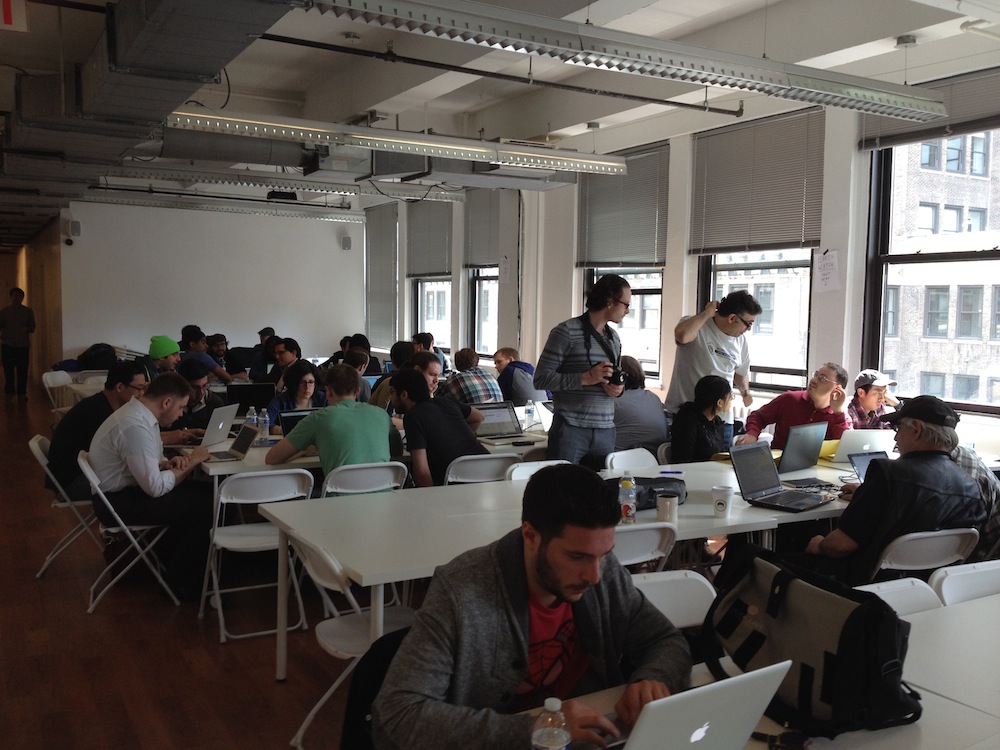NASA Space Apps 'Hackathon' Draws Future Tech Trailblazers

NEW YORK — On the 17th floor of a building here in the heart of midtown Manhattan, more than 100 computer programmers, software engineers and graphic designers huddle together in small groups, chatting excitedly, scribbling notes or furiously typing on laptops. They have all gathered to take part in NASA's third annual International Space Apps Challenge — a 48-hour global hackathon that aims to find solutions to problems faced on Earth and in space.
The two-day Space Apps Challenge event kicked off today (April 12) in nearly 100 different locations across six continents. As part of the fun contest, teams around the world will spend the weekend trying to tackle 40 challenges released by NASA.
The tasks are designed to address many of the agency's top priorities, and the event is part of NASA's growing involvement in citizen science initiatives. [10 Best Space Apps in the Universe]
The challenges fall into five categories — Earth Watch, Technology in Space, Human Spaceflight, Robotics and Asteroids — and include such diverse tasks as figuring out how to turn a smartphone into a nanosatellite; designing high-tech "smart accessories" for astronauts; conceptualizing designs for a deployable greenhouse for missions to the moon or Mars; and creating an open-source network of robotic telescopes to perform quick follow-up observations of potentially threatening asteroids.
This year, the Challenge's main event is taking place here in New York City, but across the United States, teams are competing from Baltimore, Chicago, Kansas City, Mo., Pittsburgh, San Francisco and several other locations. Internationally, the event includes participants from Qatar, Greece, South Africa, New Zealand, Nigeria, Ireland, Spain and the United Kingdom.
"There's a spirit that infects everyone when we realize all these people around the world are working on the same thing," said James Wanga, who was part of a team last year that won a Space Apps Challenge award for building a prototype of an asteroid mapper.
Wanga's work at last year's event helped him and three others launch a new company, called Go Lab, which aims to develop nanosatellites for a variety of scientific purposes.
Get the Space.com Newsletter
Breaking space news, the latest updates on rocket launches, skywatching events and more!
For this year's Space Apps Challenge, Wanga is building a network that can relay information from a device uptown to a separate device downtown without using the Internet. The technology could one day be used to create a new type of network that would allow astronauts to communicate or transmit information across vast distances while exploring deep space.
"We all understand here that we're trying to change the world," Wanga told Space.com. "This is the beginning of the space tech boom, and the people here right now are the Steve Jobs and Bill Gates of space tech start-ups."
Part of the appeal of the Space Apps Challenge is the ability to work with people who possess diverse sets of skills, said John Oquist, the creative director of Space Apps NYC.
"There are several layers of benefits," Oquist told Space.com. "NASA is getting solutions to real social needs, but this is also a huge educational and outreach effort."
Last year, Oquist and his teammates used data from NASA's Mars rover Curiosity and the Mars Reconnaissance Orbiter to build a 3D environment that lets users explore the Red Planet with a virtual reality headset made by the gaming company Oculus VR. The award-winning project, called "Chillin' on Mars," has since been featured at the New York Hall of Science and World Maker Faire New York.
The primary goal of the Space Apps Challenge is to encourage freedom of thought, said NASA astronaut Doug Wheelock, who hosted a live Google+ Hangout earlier today during the Space Apps NYC event.
"It's about casting ideas out there and hitting those sparks of innovation," Wheelock said.
At the end of the hackathon, local prizes will be awarded at each venue in the following classifications: Best Use of Data, Best Use of Hardware, Best Mission Concept, Galactic Impact and Most Inspiring. Then, a panel of NASA judges will select winners from each of the five finalist categories. Each local venue will also be able to nominate a team for the People's Choice award.
For more information about the event, visit http://spaceappschallenge.org/
Follow Denise Chow on Twitter @denisechow. Follow us @Spacedotcom, Facebook or Google+. Originally published on Space.com.
Join our Space Forums to keep talking space on the latest missions, night sky and more! And if you have a news tip, correction or comment, let us know at: community@space.com.

Denise Chow is a former Space.com staff writer who then worked as assistant managing editor at Live Science before moving to NBC News as a science reporter, where she focuses on general science and climate change. She spent two years with Space.com, writing about rocket launches and covering NASA's final three space shuttle missions, before joining the Live Science team in 2013. A Canadian transplant, Denise has a bachelor's degree from the University of Toronto, and a master's degree in journalism from New York University. At NBC News, Denise covers general science and climate change.